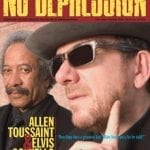Earl Brothers – Nowhere near the old mainstream
“Bluegrass now is like rock in the ’70s. It’s produced. It’s predictable.” Bobby Earl Davis sits in a San Francisco coffee shop, his right shoulder cocked and hunched. An angular, tense, Picasso blue-period Ralph Stanley, he’ll assume the same posture onstage the following night when he plays banjo and sings with the Earl Brothers. “We’re like the Ramones. We leave it jagged, punky. Mainstream festivals won’t have anything to do with us.”
The Earl Brothers (John McKelvy on guitar, Larry Hughes on mandolin, and Josh Sidman on bass, round out the ensemble) rehearse to a drum machine set to midtempo rhythms. “We use the instruments as percussion,” Davis explains. They wear all black onstage. The two contributing songwriters, Davis and McKelvy, both hold degrees in fine art and fronted punk bands. They write duet-style yelping modal banjo music of death and drinking and women. They don’t do covers. They’ve been overlooked by the bluegrass media despite releasing two albums (2004’s Whiskey, Women, And Death and this year’s Troubles To Blame) to regional acclaim.
But their outsider status is hard-earned and they embrace it. Rarely since Tony Trischka and Andy Statman’s crazed deconstructiongrass of the 1970s has anybody exercised the creative latitude that is the true legacy of first-generation “traditional” groups — the same latitude Bill Monroe so enjoyed in his experiments with electric guitar and accordion. It’s boldly different, and also completely essential.
The Earls’ myspace profile names only two influences: “the Stanley Brothers, the Ramones.” They are not simply being clever about their work, which forcefully mixes the punk intensity of the latter with the spooky howling narrative yarns of the former. It is even possible to sense amongst their mantric, harmonically spare incantations a debt to the discordant noisy fuzz of the Melvins. Davis corroborates, citing their popularity amongst “stocking-cap, Northwest grunge people.” If he had his druthers, McKelvy says, he’d open for King Buzzo, not Ricky Skaggs.
And why not? Their infusion of borderline dissonant punk inflection into hillbilly melodies jibes with the primal scream of the group that inspired Kurt Cobain more than it resembles the layered vocals of a typical Skaggs Family release. Unwilling to use genre references as a crutch, the Earl Brothers don’t beg that oft-addressed question, “What have they done to the old home place?” There’s no room for nostalgia, there’s no hope for moving on.
There is very centrally, however, an acknowledgment of decay and the inevitability of change, and a desperate crying out in the face of it. As McKelvy’s pierced, nasal yawl leans hard and quavers atop Davis’s world-worn baritone, they mingle with the early Stanleys’ mountain mystic sound. Add an extra dose of the instinctual edge that is the mark of passionate conduits like Cobain and Robert Johnson, for whom musical expression was a painful catharsis. The Earl Brothers are the present avatars of this rare intensity; they happen to hang it on bluegrassy instrumentation.
One or two instrumentals conjure images of an ebullient Monroe buck-dancing, but notes are chosen wisely. With some understated Ralph-esque perma-rolling banjo underneath tasteful, sparse bluegrass mandolin lickage (no fiddle), you’ve got a new focus of sound to match that of theme. It’s eerie the way these two musics collide and swarm in their shared value of repetition, melancholy, and the examination (and re-examination) of personal and societal decay. Theirs is a mournful ululation bailed out into the emptiness fit to shake us from complacency. Pensive, ragged, and melodicized to channel the best and most listenable of the genres they claim: It’s Rich-R-Tone meets the Ramones, and it’s just lovely.




